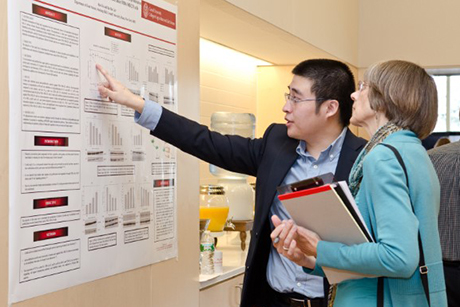Diverse ideas served up at first food systems summit
By Blaine Friedlander

Food industry professionals, retailers and suppliers gathered to learn a cornucopia of ideas and concepts at the first Cornell Food Systems Global Summit on Dec. 8.
“The participants saw that Cornell is a place where we’re focused on the broader concepts of the food system and in many ways, we’re seeking to find solutions to the challenges around those systems,” said Julie Stafford, Cornell’s industry liaison officer, who leads Cornell Institute for Food Systems Industry Partnership Program (CIFS-IPP), the summit’s host.
More than 130 participants representing 35 companies and commercial food entities listened to presentations throughout the day. “This was an opportunity to meet and hear new perspectives from people these professionals would not normally get a chance to hear,” said Stafford.
The program offered diversity of thought with several disciplines represented. Perspectives on how global agriculture could feed 9 billion people by 2050 were given by Xingen Lei, professor of animal science; Prabhu Pingali, director of Cornell’s Tata-Cornell Agriculture and Nutrition Initiative; and Michael Mazourek, assistant professor of plant breeding.
Jeff Boutelle, president and CEO of Beech-Nut, Amsterdam, New York, discussed “Delight Consumers by Conserving the Goodness of Nature,” explaining that to meet consumer demand, companies must be authentic, genuine and transparent in their marketing. He explained his company’s focus on premium varieties of food, nutritional needs and the trend to eliminate over-processing.
Bill Strassburg, vice president of Wegmans Food Markets, Rochester, New York, talked about foods from the Finger Lakes, where producers could work together to integrate resources and build sustainable businesses in the region. He hopes that within five years there will be four new food businesses located in the Finger Lakes region with 250 or more employees.
David Hochman, executive director of the Business Incubator Association of New York State, explained small-business incubators and their possible impact on state economics.
The summit also offered technology demonstrations, self-guided tours of Stocking Hall, a poster session and the opportunity to network. Economic development agencies such as the Genesee County Economic Development Center, the New York Association of Training and Employment Professionals, and Cornell Agricultural and Technology Park provided exhibits.
CIFS-IPP was established with the support of the Department of Food Science, which has a long history of supporting the entrepreneurial spirit critical to advancing new processing approaches and economic development.
Media Contact
Get Cornell news delivered right to your inbox.
Subscribe